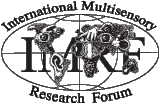A cross-linguistic ERP examination of audiovisual speech perception between English and Japanese
Last modified: 2011-09-02
Abstract
According to recent ERP (event-related potentials) studies, the visual speech facilitates the neural processing of auditory speech for speakers of European languages in audiovisual speech perception. We examined if this visual facilitation is also the case for Japanese speakers for whom the weaker susceptibility of the visual influence has been behaviorally reported. We conducted a cross-linguistic experiment comparing ERPs of Japanese and English language groups (JL and EL) when they were presented audiovisual congruent as well as audio-only speech stimuli. The temporal facilitation by the additional visual speech was observed only for native speech stimuli, suggesting a role of articulating experiences for early ERP components. For native stimuli, the EL showed sustained visual facilitation for about 300 ms from audio onset. On the other hand, the visual facilitation was limited to the first 100 ms for the JL, and they rather showed a visual inhibitory effect at 300 ms from the audio onset. Thus the type of native language affects neural processing of visual speech in audiovisual speech perception. This inhibition is consistent with behaviorally reported weaker visual influence for the JL.
References
McGurk, H., & MacDonald, J. (1976). Hearing lips and seeing voices. Nature, 264, 746-748. Sekiyama, K. & Burnham, D. (2008). Impact of language on development of auditory-visual speech perception. Developmental Science, 11(2), 306-320. Van Wassenhove, V., Grant, K.W., & Poeppel, D. (2005). Visual speech speeds up the neural processing of auditory speech. Proceedings of the National Academy of Sciences of the United States of America, 102(4), 1181-1186.


